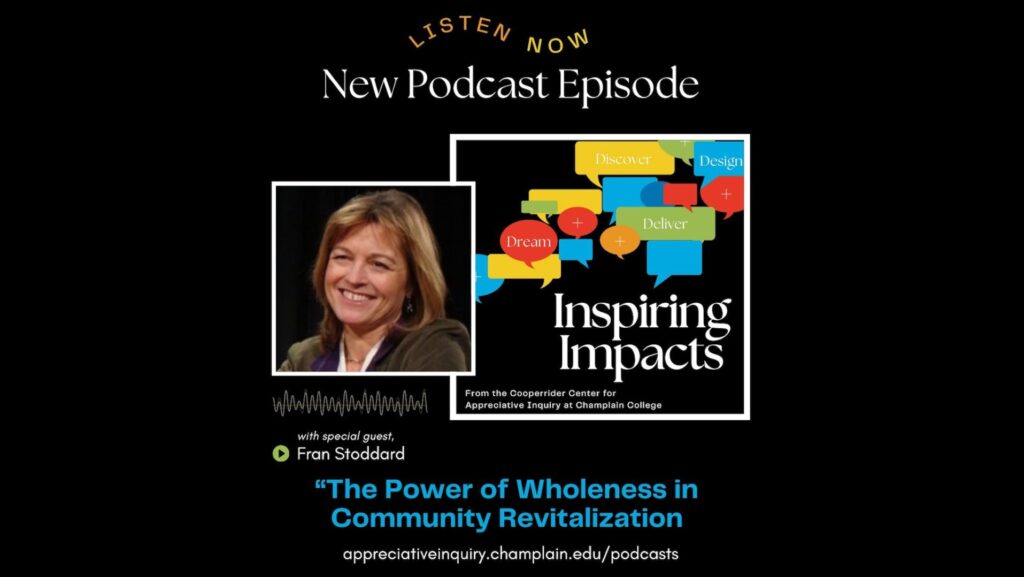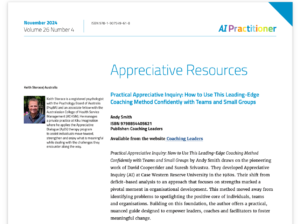Revitalising Communities with Appreciative Inquiry

[ad_1]
It’s a ‘Champlain Supernova’* this week as we share some blazing insights from the Cooperrider Center’s podcast episode with Fran Stoddard!

On the rare occasions that I find myself running low on enthusiasm or ideas for my work with Appreciative Inquiry, I can usually revitalise my thinking by listening to the Inspiring Impacts podcast from the Cooperrider Center for Appreciative Inquiry at Champlain College.
The episode I listened to this week was an interview with journalist and consultant Fran Stoddard, who uses Appreciative Inquiry to help towns and communities in the US regenerate themselves.
This won’t be a summary of the podcast (it’s only 35 minutes long and not a hard listen) – rather I’ll pick out some aspects that particularly resonated with me and enhanced my understanding of Appreciative Inquiry, its principles, and how it can be used.
“It’s about dreaming with our feet on the ground” – this phrase that Fran used (to describe part of the process that a depressed town used to start coming back) reminded me that when we facilitate the Dream stage in Appreciative Inquiry, we’re not asking people to create visions or set goals out of nowhere. Rather, the dreams have a firm foundation in reality, because they’ve already inquired into what’s already working, what’s worked in the past, and (in this case) what they love and value about living in their town.
Most other methods of change and coaching, even the more positively oriented ones, encourage people to jump straight to what they want in the future. If they’re lucky, those future goals will be consistent with what they value and what works for them, but equally they might not.
For example, left to themselves, people might come up with visions influenced by whatever ideas are fashionable at the moment, or even (such is our longing for someone to guide us on the right path) what they think the coach or facilitator wants them to say.
Only Appreciative Inquiry reliably gets you to look at what’s already working and what’s already valuable (the ‘positive core’ of the team, the organisation, or the community) before you imagine the future you want.
Always bring young people in. In her story about how the town of Biddeford, Maine revitalised itself, Fran spoke about the importance of involving younger people, as well as the older people who are more traditionally the volunteers and people who care about the community. The elders were energised by the idealism of the young people, who in turn see possibility that they didn’t see before by learning about the good things in the past. You need both for successful community change.
Who are we missing? Who isn’t here? The Wholeness Principle in Appreciative Inquiry says that, because no one person or group of people has a monopoly on the truth about a situation, we need to involve everyone affected by a change in deciding what that change should be.
In an example Fran gave from another town, the people who weren’t involved at the start were Mexican migrants – a large part of the community, but almost invisible, because they were mostly keeping their heads down. Involving those people, and overcoming the factors (like fear of deportation) that were discouraging them from getting involved, made a big difference to the overall result.
Create value statements. One of the things that Fran mentioned as useful in creating longer-term visions for towns are ‘value statements’. These are statements that answer the questions ‘What are we all about?’ and ‘What’s important to us?’ and reflect the ‘positive core’ of the community. The value statements act as guideposts for future visions, ideas, and actions, ensuring that any developments retain and build on that positive core, rather than straying away from it.
Embrace your enemies. In one of the towns that Fran worked with, that she described as ‘out West’, some conspiracists actually threatened the people working to engage the community in Appreciative Inquiry, thinking they were ‘communists’. When asked for advice for what to do about this threat, Fran advised the community to invite them along (with a ’no guns’ proviso). Meeting their neighbours disarmed the conspiracists’ fears about who these people were. Fran suggests that if a group of people is angry, bring them in and involve them in a shared endeavour like picking up trash for Earth Day.
That’s just my selection of the points that jumped out at me from a 35-minute podcast. You may find different ones that are significant to you when you listen to it.
A big thanks to the Cooperrider Center for creating these rich and informative podcasts! But if anyone from there is reading, can I ask that you please put the RSS feed on its web page so that it’s easy for people using something other than Apple Podcasts to listen to it?
* Obligatory ‘Oasis reunion’ reference
If you want to learn the practical how-tos of using Appreciative Inquiry with teams and small groups (with plenty of tips to scale up to larger-scale and longer-term change), join the Practical Appreciative Inquiry facilitator training starting soon!
“Andy is an outstanding facilitator of the Appreciative Inquiry course. His expertise, passion, and facilitation skills create a transformative learning experience for participants. They leave the course feeling inspired, empowered, and equipped with the tools to apply Appreciative Inquiry in their lives.” – Cedrick LaFleur, Founder / Chief Executive @ LaFleur Leadership Institute, USA
[ad_2]




